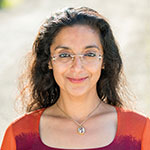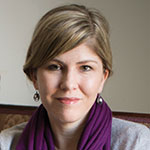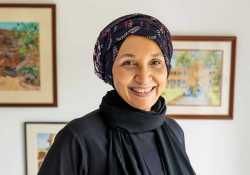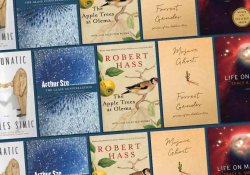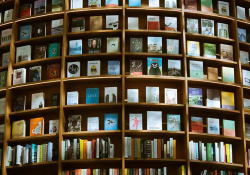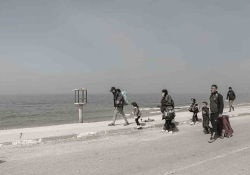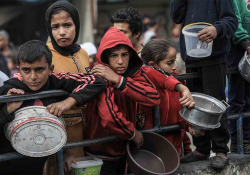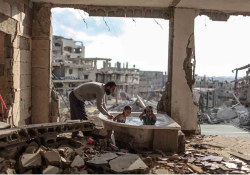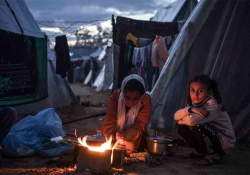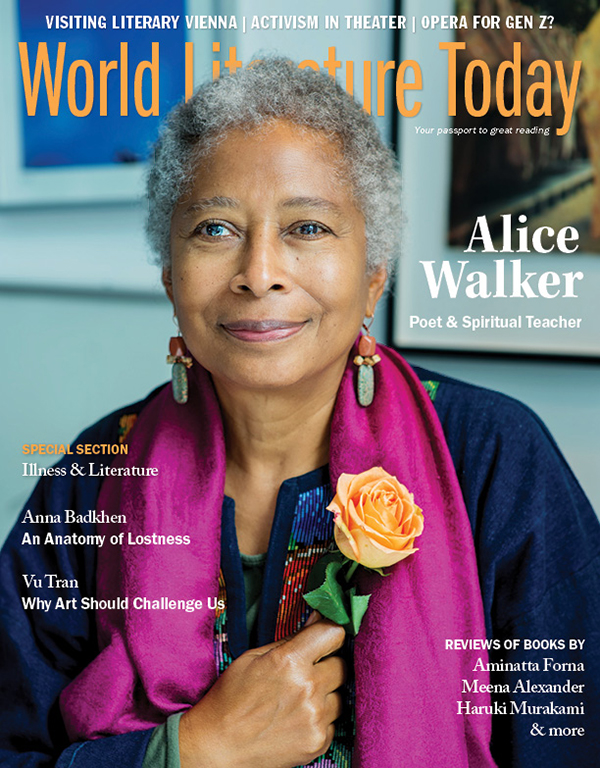Playtime in Vienna: The Austrian Literary Scene Finds Its Sense of Humor
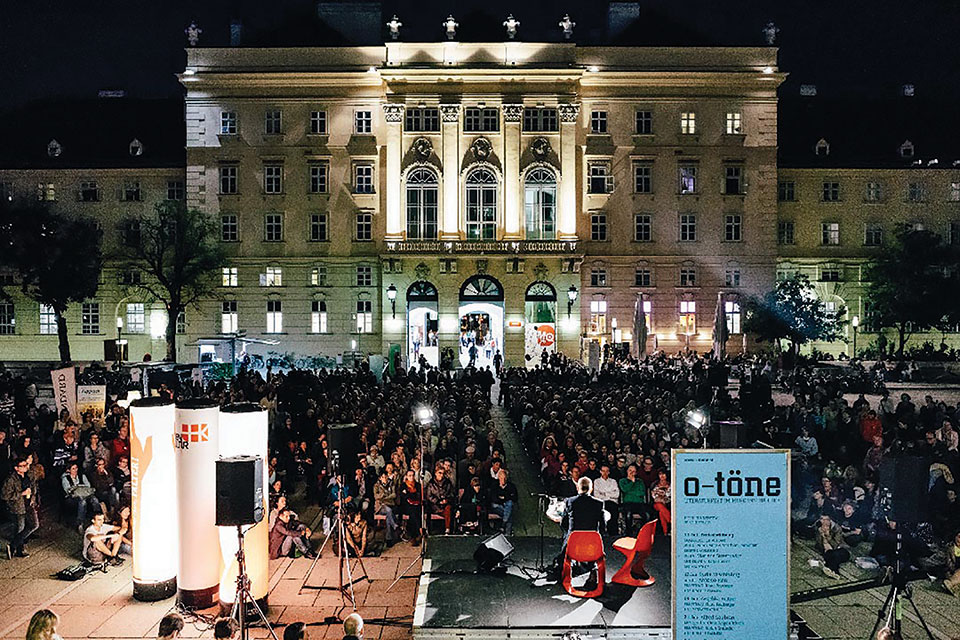
At the new Literaturmuseum, nestled in a historic building on Johannesgasse in Vienna’s 1st District, there is a wall devoted to the word Kafkaesque, displayed in a half-dozen languages. Though Kafka was Czech, he spent much of his life in Vienna, and the city claims him as a native son.
Beneath the Kafka wall, one of the museum’s founders and curators, Hannes Schweiger, begins reciting a poem by Ernst Jandl, a midcentury Austrian poet and translator famous for his Sprechgedichte, or sound poems. Thanks to the poem’s intrinsic playfulness and Schweiger’s enthusiastic performance, the German words traverse the linguistic divide, bringing smiles to the faces of the American students who make up his audience. Schweiger informs us that there is a push to make jandling a verb denoting a kind of experimental wordplay, though it has yet to gain the traction of Herr Kafka’s adjective. Next, our group files into a small movie theater, where we watch Jandl jandling in front of thousands of fans in Royal Albert Hall, including a reverent Allen Ginsberg.
The Literaturmuseum, which opened in 2015 and is affiliated with the city’s National Library, offers a glimpse of the country’s literary history as a kind of palimpsest, where the emergence of giants like Thomas Bernhard and Nobel Prize winner Elfriede Jelinek can be understood in the context of predecessors like Stefan Zweig and Ingeborg Bachmann.
The museum also does an impressive job of representing the dualities of Austrian literature, allowing Kafka’s absurdism and Jandl’s avant-garde playfulness to butt up against the sobering realities of history; a section of the museum is devoted to those Austrian writers murdered in the Holocaust as well as those who survived the violence. A haunting telegram from Hannah Arendt, sent from New York City on May 23, 1941, says only, We are saved. A chilling display resembling a train schedule lists the names of writers beside the names of the concentration camps where they died.
In the context of this history, one begins to understand why Bernhard, in his novel Woodcutters, writes, “I hated Vienna yet could not help loving it.” It is a city where, in 1913, Hitler, Trotsky, Tito, and Stalin all resided, frequenting the elegant Kaffeehäuser and nurturing the dark ideologies that would disfigure the world in just a few short years. It is a place that birthed both world wars, with their attendant traumas, as well as modern psychoanalysis, courtesy of Sigmund Freud, who practiced out of his home in the 9th District (the home has been turned into a museum).
The aesthetics of twentieth-century Austrian literature are inextricably linked to the traumas of the country’s past: Bernhard’s relentless rants against Haus Wolfsegg—a stand-in for House Austria—in his masterwork, Extinction; the sinister, fascistic mother figure in Jelinek’s The Piano Teacher, as well as the graphic violence of the prose. Even Jandl’s silly stylings reckon with war: in one of his most famous sound poems, “schtzngrmm,” the words reproduce the sounds of weaponry. An experimental writers’ collective called the Vienna Group, of which Jandl was a member, emerged after World War II seeking to preserve the Austrian dialect from German influence and to valorize free expression as a means to oppose totalitarianism. It is impossible not to read these authors in a Freudian context, doomed to perpetual struggle against the brutalities of the fatherland.
Beneath the city’s formal, elegant surface pulses an energetic, playful, and vibrant literary scene, one peopled by writers and tastemakers who understand the past but are not burdened by it.
But step into twenty-first-century Vienna, and the city—its writers and literary advocates—present a very different face. Beneath the city’s formal, elegant surface pulses an energetic, playful, and vibrant literary scene, one peopled by writers and tastemakers who understand the past but are not burdened by it; who engage with the troublesome political questions of the day but are also free to make art for art’s sake.
On a midsummer evening, a thousand people gather in the central square of the MuseumsQuartier, a sprawling arts complex housed in what was formerly the Habsburg stable. Technically, they are here for O-Töne, a literary festival that presents author readings every Thursday evening, but in actuality they are smoking joints and drinking wine, giving the event a carnivalesque atmosphere and rendering the authors—reading from a large, brightly lit stage beneath colorful museum banners—somewhat secondary to the party.
Or at least the first author, a debut writer by the name of Marie Gamillscheg, for whom the microphone is faulty and the audience, restless. But when literary heavyweight Robert Seethaler takes the stage, a hush falls over the crowd, and miraculously—and quite unfairly—the microphone volume is dialed up a few notches. A trained actor, Seethaler’s resonant voice moves over the crowd. Shortlisted for the Man Booker International Prize in 2016 for his novel A Whole Life, tonight he reads from his latest work, Das Feld (The field), which is not yet available in English translation.
Despite the natural difficulties that arise from offering a literary event in an open-air space—yapping dogs, skateboarding teenagers—there’s something enchantingly democratic about a city that dares to place its literary writers on a stage in the middle of a party, inviting all comers to bask in the fine language, if only for a moment.
Leave the cheerful noise of the festival and wander through the gardens separating the palatial Kunsthistorisches Museum from its twin, the Naturhistorisches Museum, past the resplendent National Library, and emerge into the narrow, cobblestoned alleys of the 1st District. There, St. Stephen’s Cathedral casts its gothic shadow over cozy Kaffeehäuser frequented by Vienna’s literati, who, according to the writer Judith Nika Pfeifer, still view coffeehouses as a kind of “third space” where they can work, eat, socialize, and carouse. Of coffeehouse culture, Austrian-Israeli writer Doron Rabinovici writes: “Everyone has a right to their coffeehouse. And actually even to three; one where he can show his face, one where he can go unnoticed, and one in which he never, never wants to set foot.”
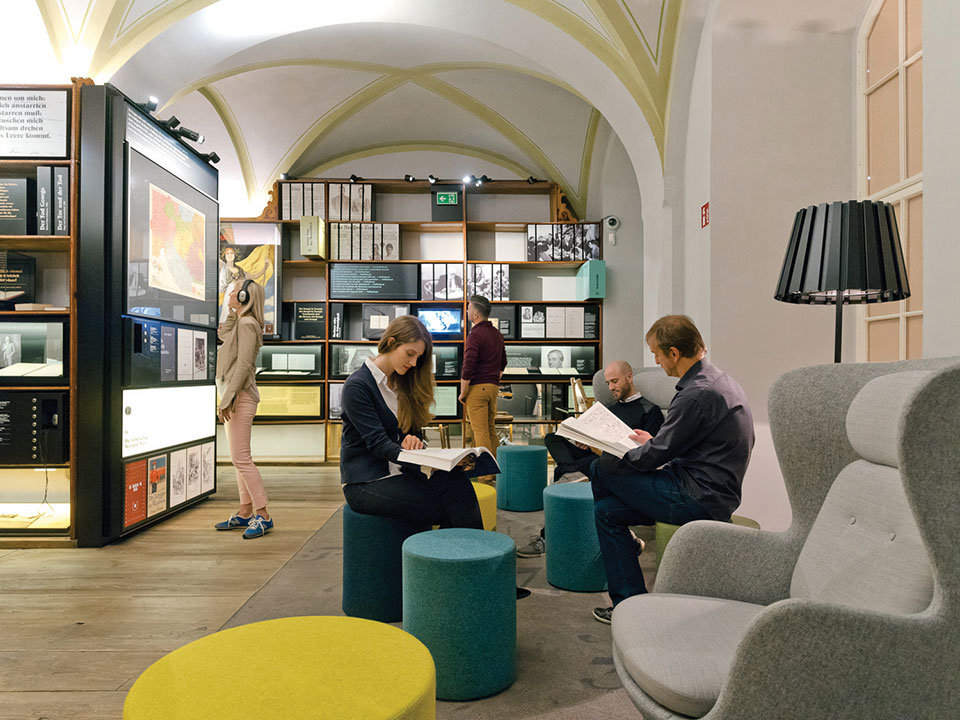
One of the grande dames of Kaffeehaus culture is Cafe Korb, the preferred spot of Elfriede Jelinek. Indeed, crowded together on a red velvet banquet with Pfeifer on a stormy Viennese afternoon, rain pouring off of café umbrellas in sheets, we can feel the moody energy of this place steeped in literary history. “We’ve got to soak up all the vibes,” says Pfeifer, a luminous poet and fiction writer, who, though based in Berlin, believes strongly in the literary life of her home city, of which she says, “Though rather conservative-looking on the outside, Vienna provides a great playground—there’s a long tradition of experimental, quirky, avant-gardist art and literature in Vienna. . . . Of course, there’s also a more market-oriented literature; it’s this diversity that makes the scene so rich and beautiful, and I am grateful to all the decision-makers and engaged literary people that made and make this possible.”
Though rather conservative-looking on the outside, Vienna provides a great playground—there’s a long tradition of experimental, quirky, avant-gardist art and literature in Vienna.
Another storied spot is Café Engländer. Its location around the corner from Alte Schmiede, which each year hosts more than 150 readings and events, makes it an ideal postreading gathering space for writers, editors, and literature lovers. It is a Monday in July, and though many Austrians have decamped for holidays in the countryside, Viennese literary life churns on. Around the table are Florian Neuner, an experimental writer who has given a reading tonight and who publishes the annual magazine Idiome; Peter Pessl, who also read; there’s the author Annalena Stabauer, who introduced and interviewed the authors for Alte Schmiede; and Ilse Kilic and Fritz Widhalm, who run a literary press called Das fröhliche Wohnzimmer (The Cheerful Living Room). We are all guests of Daniel Terkl, Alte Schmiede’s literary events programmer.
Compared with the large-scale production of O-Töne, the readings at Alte Schmiede are intimate, churchlike. The name, which translates to Old Smithy, comes from the space’s previous life as a blacksmith shop, and in one of the two event spaces on site, authors hold forth amidst a battery of blacksmithing tools—hammers, anvils, thousands of various-sized pikes—which make the space intensely atmospheric, reminiscent of both torture chamber and S&M dungeon.
There is an air of relaxed expectancy as the people arrive. Most guests are greeted individually with a handshake, and people nod hello to each other. Stabauer takes her place at the podium, briefly introducing Neuner, who then reads from his third book, Drei Tote (The three dead): “A fight against disease, the city of Essen, impending poverty in old age. Against alcohol. Against forgetting.” Peter Pessl reads next, framed by the projection of a giant mouse, his illustration of the title figure of his book Mamamaus Mandzukic: Zaubermärchen aus der Traumazeit (Mamamaus Mandzukic: Fairytales from the trauma period). The language is musical and reminiscent of jandling. Mamamaus and associates metamorphose on the screen as the setting changes from Palmyra to Ravensbrück to the Roman ghetto. The playful narrative is lulling yet powerful, harking back to war and terror in its subtones. The audience applauds, and we move to the Alte Schmiede library to converse and buy books.
After the event and subsequent dinner at Café Engländer, Terkl takes us back to Alte Schmiede for a private tour. He moves happily among the tools, switching on lights, wielding a hammer like a bookish Thor. He tells us that Alte Schmiede averages forty-five guests per event, an impressive number given that they put on three to four events per week and must also compete nightly with Vienna’s robust cultural programming. Upstairs is a public work space lined with a display of the latest German-language literary magazines, and Terkl draws our attention to manuskripte, one of Austria’s most esteemed journals, based in Graz and now edited by the poet Andreas Unterweger. Rumor is that the Viennese smile sparingly, but Terkl is an outlier; the joy he takes from his job, as well as his pride in the literature, are readily apparent.
Alte Schmiede is funded primarily by the cultural department of the city of Vienna, reflecting the strong tradition of government support for the arts in Austria. The arts and culture division of the Austrian federal chancellery provides grants and stipends to individual writers through a juried application process. Additionally, many of the country’s publishing houses are subsidized by public money, reflecting the Austrian view that the production of high-quality books is a public service necessary to society’s flourishing.
“Most of the authors here, they’re happy if they sell three or four hundred books. If you sell ten thousand, that’s a best-seller,” Terkl says.
Compare this writer-friendly system to the hypercapitalistic American model of the “Big Four” New York publishing houses, where books are mass-produced commodities whose worth is almost wholly determined by the profit they turn, and where authors are forced to transform into salespeople when their books are published, stumping for each sale on social media as if their lives depended on it—because, in a way, they do. Awarded large advances based on little more than an editor’s instincts, American writers are then forced to live and die by their sales performance.
The author Angelika Reitzer turns up to teach a seminar on contemporary Austrian literature carrying a haul of recently published books: Johnny und Jean and Oh Schimmi, by Teresa Präauer; Du bist mein Meer (You are my sea) and Das kostbarste aller Geschenke (The most precious of all gifts), by Andreas Unterweger; and her own novels, Obwohl es kalt ist draussen (Although it’s cold outside) and Wir Erben (We, the heirs).
They are beautiful objects, the pages thick and creamy; the cover art—rather than the tired photographs of women’s heads one sees so often in the States—is actually art, gold-foiled, embossed, painterly. The care with which these books has been produced is evident, and it is a pleasure to turn them over in the hand. Unfortunately for now, that’s the extent to which an English-speaking audience can enjoy them—none are yet available in translation.
Though the Viennese live in a highly globalized world—American and British pop music is inescapable in Vienna—the literary scene remains somewhat pure of influence, or at least contemporary influences.
Though the Viennese live in a highly globalized world—American and British pop music is inescapable in Vienna—the literary scene remains somewhat pure of influence, or at least contemporary influences. When asked which American writers the Viennese are reading, two people remarked on the popularity of the Beats (the Vienna Poetry School was modeled after the Jack Kerouac School of Disembodied Poetics in Boulder, Colorado), and this year Vienna hosted the European Beat Studies Network Conference (“Beats and Politics: Past and Present”). At one point, George Saunders comes up, and our guest stares blankly at us; we’re told that Austrian writers don’t really read the Paris Review or the New Yorker.
But why would they? German is their mother tongue, and there are an abundance of German-language literary magazines to read and submit to. There are a number of Vienna-based literary magazines, including Der Hammer (Alte Schmiede’s magazine), Wespennest, Zeitzoo, Literarisches Österreich, Podium, Flugschrift, and Idiome. Fritz Widhalm from Das fröhliche Wohnzimmer hands us the fiftieth and final issue of the journal he and his wife publish, which is titled Die Zeitschrift für unbrauchbare Texte und Bilder (Magazine for useless texts and images), a sly nod to Wespennest, which claims to be “the magazine for useful texts and images.”
Rather than look toward New York for inspiration, Viennese writers look to Berlin, that bigger, edgier sister city to the north, to which many Austrian writers have defected. The German market is ten times larger than the Austrian one, and many of Austria’s most famous writers had close ties to German publishing houses, such as Thomas Bernhard and Suhrkamp/Piper, Elfriede Jelinek and Rowohlt.
Though Viennese literary life has traditionally been viewed as sleepier and more buttoned-up than that of Berlin, the city’s current vibrancy is undeniable. Even the definition of what it means to be an Austrian writer has shifted as the culture embraces the multiplicity of voices that now comprise the country. Maja Haderlap, a bilingual Slovenian-German Austrian prose and poetry writer, won the Ingeborg Bachmann Prize in 2011 for her novel Engel des Vergessens (Eng. Angel of Oblivion, 2016), an account of Austria’s only military resistance movement against the Nazis. Ilija Trojanow is a Bulgarian-German writer, translator, and publisher who, after receiving political asylum in Germany, now calls Vienna home. The Viennese chapter of the PEN organization regularly publishes diverse Austrian authors writing in their native languages, alongside German translations, in the online journal words&worlds.
Even the definition of what it means to be an Austrian writer has shifted as the culture embraces the multiplicity of voices that now comprise the country.
Still, the past is never entirely past, and though they compose in a new century, Austrian writers are keenly aware of the rising threats of far-right politics across Europe and at home in the form of the Austrian Freedom Party, which in 2017 created a coalition government with the center-right Austrian People’s Party. Alte Schmiede’s Daniel Terkl says, “Many are writing about the so-called migrant crisis. Many are referring to politics again. The rise of the far right has increased writers’ engagement with political questions.”
Though Bernhard was derided by many Austrians for being a Nestbeschmutzer (roughly: one who shits where he eats), he spoke truth to power through his literary rants against Austria’s provincialism and embrace of fascism. The people we encounter in Vienna say that Austria has yet to fully reckon with its complicity in Hitler’s rise and its historical reputation as, to use Reitzer’s words, “a playground for the right wing.” They speak of a kind of latent Austrian fascism, one that lies dormant for periods of time but never quite dies.
In these uncertain political times, it is possible to take comfort in the fact of Vienna’s literary robustness, for literature provides a necessary counternarrative to damaging propaganda and fake news and provides people with a way to engage meaningfully with one another, without the mitigation of a screen or a politician.
Ray Bradbury once said, “You don’t have to burn books to destroy a culture; just get people to stop reading them.” There’s little risk of that in today’s Vienna, where the cultural fabric is indeed strong, and where a small army of writers and intellectuals are poised to defend the hard-won free society that defines the city and country today.
It’s close to eleven o’clock in the evening, and we’ve stumbled away from the Seethaler reading and the crowd in MuseumsQuartier. In the mild evening, we amble into Heldenplatz, where the magisterial National Library glows gold against the night. The library celebrates its 650th anniversary this year. Many of its holdings were looted from Jewish families and other victims of the Third Reich, and in 2003 the library began returning these items to the rightful owners or heirs.
We pause beneath the Michaelerkuppel dome and sing out a few notes, watched by nearby statues of the Virtues. Under cover of darkness, Vienna’s grandness yields to intimacy. History is all around us, impossible to ignore. But the night is new, the breeze, fresh. As we walk on, we imagine Bernhard’s character racing before us, admitting defeat in the face of Vienna’s complicated seduction: “And now, as I ran through the streets of the Inner City, I thought: This is my city and always will be my city.”
Vienna / Tulsa
